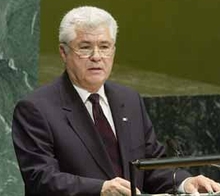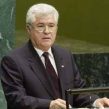
A CHANCE TO CIVILIANIZE RUSSIA’S “PEACEKEEPING” OPERATION IN MOLDOVA
Publication: Eurasia Daily Monitor Volume: 4 Issue: 113
By:

An “Extraordinary Conference of the States Parties to the Treaty on Conventional Forces in Europe” (CFE) opens today in Vienna, to run through June 15. Russia exercised its right — as one of the 30 state-parties to that treaty — to convene this conference on short notice. Moscow has artificially created an emergency atmosphere around this event by threatening to suspend its own compliance with either the original 1990 or the 1999-adapted CFE Treaty.
Russia hopes to browbeat NATO and EU countries into ratifying the 1999 treaty while tolerating indefinitely the ongoing breaches of Russia’s own obligations — the Istanbul Commitments — within that same Treaty. Once the 1999 treaty is brought into force, its scope would be extended to cover the three Baltic states, where Russia wants to introduce limits on any hypothetical deployments of Western forces. This would be a win-win outcome for Russia in southern and northern Europe.
With Russian troops finally on their way out from two bases in Georgia, the unlawful presence of Russian troops in Moldova stands out as a major remaining unfulfilled Russian commitment under the 1999 package. The “Operational Group of Russian Forces” in Transnistria consists of a reported 1,500 troops, one or two battalions of which are earmarked for “peacekeeping” duty by rotation. The Russian base at Gudauta in Georgia and Russian-supplied arsenals to post-Soviet secessionist forces (Transnistria, Abkhazia, South Ossetia, Karabakh) are the other ongoing breaches.
Through shrill rhetoric and a little German help, Moscow hopes to break the Western policy of linking ratification of the adapted CFE Treaty with Russia’s fulfillment of the Istanbul Commitments, primarily on Moldova.
For their part, the United States and some allied countries propose to accept a small number of Russian troops remaining in Moldova as part of an internationalized peacekeeping operation for a limited period of time. Russia would evacuate or scrap its ammunition stockpiles as well as withdrawing part of its troops. The internationalized operation would be a military one, though potentially reformable into an operation with greater civilian content later on (see EDM, June 8).
Its outline revealed by the U.S. State Department in Brussels on June 5 (AP, Reuters, June 5), this looks like a creative solution to satisfy all sides. The Western allies would announce Russia’s fulfillment of the Istanbul Commitments (or, preferably from Moscow’s viewpoint, would simply consign Istanbul to oblivion) and would open the way for Russia-desired ratification of the CFE Treaty. At the same time, Moldova would be rid of part of the Russian troops while hosting Western troops that would more than offset Russia’s in Moldova, and with a prospect of removal of remaining Russia troops later on.
Whether Russia would accept this solution — or at what political price — is far from certain, however. Moreover, the details regarding structure, command, mandate, and other key issues would remain to be settled through negotiations — with Russia, on one hand, and among Western countries, on the other hand. Moscow could string out this particular negotiation for a long time. It could even block it through the familiar tactic of defining the internationalization of the peacekeeping operation as conditional on a political settlement of the Transnistria conflict, even as Moscow itself blocks that settlement through Tiraspol. The Kremlin counts on Berlin to continue supporting such sequencing.
Moldova’s position goes further than the emerging Western proposal. In addition to internationalization, Chisinau calls also for “civilianization” of the peacekeeping operation. It proposes turning the Russian military operation into an international mission of civilian and military observers, with some small military backup, under an international mandate.
Chisinau first called for civilianizing the peacekeeping operation in 2005 and has adhered to it steadfastly since then. President Vladimir Voronin’s recent search for accommodation with the Kremlin notwithstanding, Moldova’s delegation at the June 11-15 Extraordinary Conference is acting under presidentially approved instructions to call for the withdrawal of all foreign forces from Moldova and deployment of an international mission of civilian and military observers.
This position can prove effective, certainly as an opening gambit and probably also in the upcoming negotiations over how to transform the existing “peacekeeping” operation. If — as seems likely — Russia would try to dominate a follow-up operation or stonewall it altogether, Moldova could always call for a civilianized operation as a way around such Russian difficulties.
Moreover, rightly or wrongly but almost inevitably in this situation, Chisinau worries about a trade-off at its expense. This could take the form of Western allies declaring Russia to be in compliance with its Istanbul Commitments, in return for a mere promise of compliance rather than the actual one. However, the adapted CFE Treaty cannot be ratified in the absence of host-country consent to the stationing of foreign troops on its territory. Moldova would eagerly give such consent to a genuine international operation, but only after it is in place and not if it turns out to be revamped only cosmetically.
Given the likelihood of Russian obstruction of this process, Moldova seems well advised to stick to its position at least for the time being and use it as a bargaining card if necessary in follow-up stages of negotiations toward internationalizing the existing operation. The use of bargaining cards in negotiations — along with flexibility in the negotiations — would be a sign of normal state behavior on Moldova’s part.
The goal of civilianizing the peacekeeping operation could also create synergy with Georgia, the parliament of which has called in July 2006 for deployment of internationally mandated civilian missions — mainly police units — in place of Russian “peacekeeping” troops in Abkhazia and South Ossetia (see EDM, July 20, 2006).




